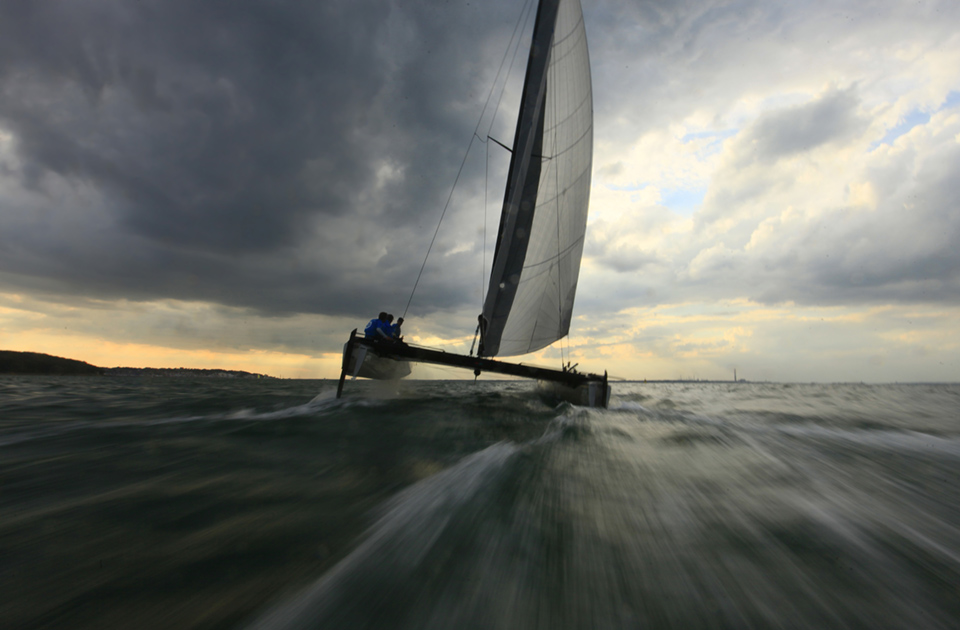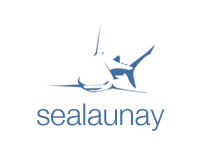
GC32s closing on 30 knots
The Great Cup has completed its third day of GC32 catamaran racing at Aberdeen Asset Management Cowes Week. Thanks to a technical issue on one of the three boats competing, the racing on the Solent has become a two boat affair between SPAX Solutions and Time on the Water.
Today was one of breaking new records for the state of the art Martin Fischer-designed catamarans. Cowes Week courses are a long way away from the multiple short race format that the teams are used to sailing. Today the Multihull Class, of which the GC32s are a sub-group, was dispatched on a course taking them all the way up the Western Solent, on a multiple leg course between Lymington and to Cowes, on a single high speed race lasting 2 hours 20 minutes. After a relatively light start to the day the wind the sea breeze kicked in, building to 17 knots and with this SPAX Solutions set a new GC32 speed record of 29.1 knots.
The Swiss Marwin team, skippered by Olympic Star sailor Flavio Marazzi, led out of the start, covering their opponent, but it was SPAX Solutions, skippered by founder of The Great Cup, Laurent Lenne that overtook on the third leg and from there never looked back. But the two one design catamarans remained in close contact all the way to the finish.
Sailing with Laurent Lenne on SPAX Solutions today were Swedish Volvo Ocean Race sailor Mikael Lundh, Kiwi AC45 sailor James Williamson and British former 49er sailor Rick Peacock.
“We had a few tricky moments when we passed a mark with the current,” says Lenne, who hasn’t raced on the Solent since he studied Naval Architecture at Southampton Institute a few years ago. “We almost ended up on top of this big cardinal mark and then at the finish a VIP boat tried to cross ahead of us and we had to duck them with our genniker up. But the racing was good. We were really constant, quick upwind and downwind. The boat felt great.”
Racing in the wind and waves of the Solent comes as a great relief following the two regattas of the Great Cup held so far on lakes in Austria and Switzerland. “The boat has been designed to sail on the sea. For me it is where it should be sailing, in current and big waves,” says Lenne.
British Olympic Tornado sailor and multihull specialist Hugh Styles has been racing on the GC32s at Cowes Week too. “It has got the opportunities of all the bigger cats I have sailed on before, but you can play with the foils to give you some more performance,” he says of the GC32. “And the performance is just electric!”
When sailing the double-S configuration foils on the GC32 are both constantly kept down, but their pitch can be altered to provide either positive or negative vertical lift. More positive vertical lift can be applied to the foil in the weather hull to help it fly in marginal conditions, but in more breeze, this same foil can be articulated in the opposite direction, dragging the weather hull down, effectively increasing righting moment.
“That gives us the opportunity to fly the hull earlier and once we get foiling we can use the foil to create grip on the windward hull, like having extra crew sitting there,” says Styles, who adds that using the foils as describe has allowed them to be hull flying in as little as 8 knots. Typically it is the bowman who constantly trims the foil.
With Cowes Week on and several top international racing boats in the Solent area preparing to take part in the Rolex Fastnet Race on Sunday, several VIPs have been for a ride on GC32, including Irish MOD70 crewman and round the world sailor Damian Foxall, who was suitably impressed with the new catamaran. “He came for a little look and was buzzing at the end of it,” says Styles. “We tried all sorts of different configurations with the centreboards and inclining the L-shaped rudder forward and back. You realise that for years and year you have focussed on everything above the water, but there is so much to be had on how the appendages work below the water.
“You see Extreme 40s downwind and they pitch a lot, whereas with this you are locked in on this constant pitch angle fore and aft – it is really stable. You feel really safe on board even in bear-aways.”
Tomorrow will be the final day of racing for the GC32s at Aberdeen Asset Management Cowes Week.
Words: Sailing Intelligence
Photo assignment for The Great Cup – www.thegreatcup.com




